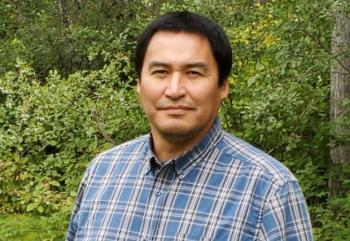Image Caption
Summary
Local Journalism Initiative Reporter
Windspeaker.com
Floyd Bertrand’s name will not be on the ballot for chief as Acho Dene Koe First Nation members go to the polls on April 26 to vote for their next band council.
The decision to dismiss Bertrand’s application for interim relief that would see his name included on the ballot was rendered by Federal Court Justice Sebastien Grammond March 25, two days after the hearing.
Bertrand says he is disappointed with the ruling but believes lack of time and not a weak argument is what brought about the decision.
“Everything happened so quick. We didn’t have much time to prepare. And it seems to me like the judge is making reference (in the decision that) there’s not enough time to fully consider everything within the case,” said Bertrand.
Bertrand’s nomination for chief was denied when he submitted his nomination papers on Feb. 23. Legal action began March 2 and the court hearing took place March 23.
“The evidence in the motion record was assembled over a two-week period and consists of affidavits with attached documents. There was no opportunity for cross-examination. I would be doing a disservice to all parties and the community if I were to order Mr. Bertrand’s name to be placed on the ballot on the basis of such an incomplete evidentiary record,” wrote Grammond in his nine-page judgement.
Grammond denied the motion saying Bertrand had not shown that he would suffer irreparable harm by not having his name included.
“He will be able to challenge the results of the election, including the fact that his candidacy was rejected, through the appeal process created by the First Nation or, in the alternative, by applying to this Court,” wrote Grammond.
That appeal process was one of the arguments Bertrand’s legal counsel Orlagh O’Kelly offered as to why the matter needed to be considered by the court now.
O’Kelly held that the 2007 custom election code, which was being followed although it had not been ratified, has reference to an appeal committee but that committee consisted of only a single person. She claimed there was no appeal process for Bertrand to use prior to the election and if he waited until after the election it would be too late.
Grammond held that even if the nation’s election code wasn’t ratified, the nation hadn’t challenged “the validity of the process it created” and as such Bertrand still had an avenue for appeal.
O’Kelly also argued that the nation was “cherry-picking” from the 2007 custom election code the criteria that would be used to disqualify candidates. In the case of Bertrand, the Acho Dene Koe chief electoral officer held that Bertrand had an outstanding debt to the nation and that disqualified him, dismissing his candidacy. Bertrand denied that was the case.
However, Grammond referenced background material indicating that Bertrand either chose not to run for chief in a couple of elections or chose to withdraw his nomination because he was told he had an outstanding debt.
“The issues raised by Mr. Bertrand are serious. This is not to say that he will surely prevail or that Acho Dene Koe has no defence. These issues deserve careful consideration. However, I am unable to find that Mr. Bertrand has a strong likelihood of prevailing,” wrote Grammond.
Bertrand says he’ll wait until after the election to decide his next course of action. While not ruling out court action again, he did not commit to it.
“There’s still opportunity to address this in the future,” he said.
If Bertrand does decide to challenge the election result and he is successful, he is unclear whether a new election would be held for chief only or for the entire council.
“I’m going to have to discuss this with legal counsel and come up with the best way this could be resolved,” he said.
The decision is still pending in a separate proceeding brought before the court in which Bertrand has challenged Acho Dene Koe chief and council for postponing the First Nation’s election. Canada is also named in that court action. That hearing took place March 22.
Local Journalism Initiative Reporters are supported by a financial contribution made by the Government of Canada.

